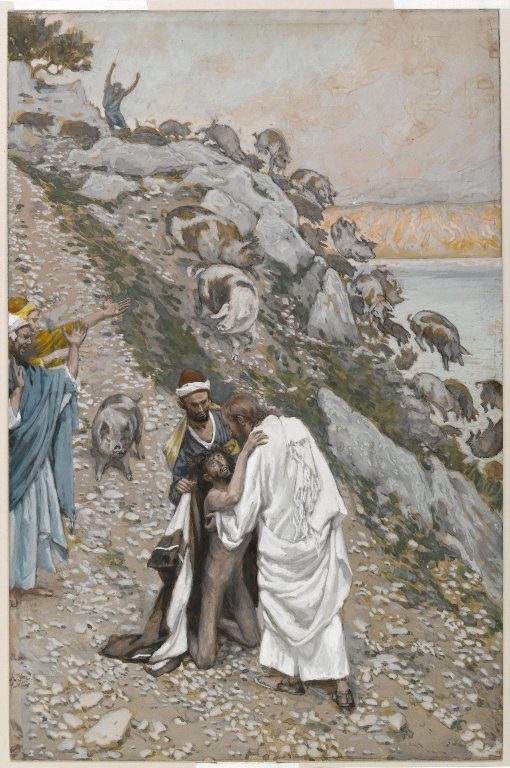
The Swine Driven into the Sea, by James Tissot (1836-1902) [public domain / Wikimedia Commons]
*****
Prominent online atheist Jonathan MS Pearce (A Tippling Philosopher) loves to write about alleged biblical contradictions. He produced the post, “On Harmonising Biblical Contradictions” (7-23-17) and was kind enough to mention my name in the beginning:
This is a post I once made for John Loftus at Debunking Christianity [my italics] and contradictions came up in a recent conversation with Dave Armstrong, so here it is. Contradictions, as Dave stated, can be harmonised, or found not to be contradictions, or are so insignificant as to not be of bother to the Christian. However, what is really interesting is how the Christian mind deals with them.
He continues:
As mentioned, many [contradictions] are fairly irrelevant in the scheme of things and don’t really invalidate the core claims of the Bible, only the claims of inerrancy. What it does show, however, is the rationalisation process of the average Christian. Not only is the process hilarious to watch, but the answers given vary so widely amongst defenders of inerrancy (and even amongst liberal defenders who instinctively try to protect the Bible’s accuracy) that it seems fairly obvious as to the ad hoc nature of the defences.
One such example is the use of Gadarenes and Gerasenes that I will look into in more depth in this post and show how bad such attempted harmonisations can be.
Mark 5:1-2
They came to the other side of the sea, into the country of the Gerasenes. 2 When He got out of the boat, immediately a man from the tombs with an unclean spirit met Him,
Matt 8:28
When He came to the other side into the country of the Gadarenes, two men who were demon-possessed met Him as they were coming out of the tombs. They were so extremely violent that no one could pass by that way.
Luke 8:26-7
Then they sailed to the country of the Gerasenes, which is opposite Galilee. 27 And when He came out onto the land, He was met by a man from the city who was possessed with demons;
We have two problems here:
Problem 1 – the Gospels contradict each other on where this took place – the country of Gadara or the country of Geresa
Problem 2 – one or two demons
Most skeptics claim that there is clear contradiction in both of these. The accounts are clearly referring to one single event, so there can’t be two events in nearby places.
It’s ridiculous to claim with any confident certainty as to whether these instances are even contradictions. The “one or two” [men / demons] supposed “contradiction” is clearly not one at all, by the rules of logic. This is one of the most common atheist / skeptical errors: in their rush to show how absurd the Bible and Christians are, to believe all this stuff that they despise so much. Mentioning one is as easily explained as saying that one writer drew from a (non-infallible) oral tradition in which one was mentioned, and the second from a tradition that mentioned two. Even those weren’t necessarily contradictory. In order to be, one account would have to say “only one” and the other “two.” That would be a logical contradiction. But they don’t and so it is a non sequitur (like innumerable atheist “exegetical” arguments are).
Jonathan, oblivious to the rules of logic, nevertheless asserts that “most skeptics” believe there is a “clear contradiction” here. So much for the cogency and logical coherence of their thinking. It’s embarrassing, but there it is. All we need do (as St. John Chrysostom and St. Augustine did) is posit that one person was more remarkable or prominent than the other. Mark and Luke mention one, Matthew two. Likewise, in Matthew 20:30, two blind men are mentioned (with again one mentioned in Mark and Luke).
The number of demons are multiple in all accounts (Mk 5:9-12; Mt 8:31; Lk 8:30-33), so that is a non-issue as well. Why, then, does Jonathan wonder about “one or two demons”? It’s neither. It is “many.”
Now onto the place names. Gerasa is (as we know) some 30-35 miles southeast of the Sea of Galilee (but may have also been the name of the larger region). Wikipedia states about it: “In the second half of the 1st century AD, the city of Jerash achieved great prosperity”. Gadara is about six miles from the sea. Its ruins include two amphitheaters, a basilica, temple, a hippodrome, aqueducts, and colonnades: showing its importance and stature. “Gergesenes” is also in some manuscripts (Khersa or Gersa was a town actually on the shore of the sea). I visited it myself in Israel in October 2014. It has a huge cliff going down to the sea (the coast, however, being a bit further away, since the earthquake in Galilee in 749). Commentator R. C. H. Lenski states:
The distance of these cities from the lake is immaterial for the narrative since this deals with the region that is near the lake and not with the vicinity of either of the cities to the lake.
Jonathan concedes the existence of both cities: Gerasa (“at least 20-30 miles from Gadara”) and “Gadara, quite an important place, whose region must then have surely spread to the lake shore. This is why ‘the country of the Gadarenes’ makes some sense.”
Personally, I think that the most plausible explanation is that the seemingly “contradictory” accounts are simply using alternate names for the same area. As we all know, this is very common today. Jonathan is from England. Or is he from Great Britain? Or the United Kingdom? All are valid names for the same country. I’m from America; also known as the United States. Ancient Persia is now Iran. Ancient Babylonia is Iraq. France is also Gaul.
I myself am a midwesterner, a Michigander (indeed, from the “land of the Great Lakes”), and Detroiter (also known as Motown and the Motor City and the Automobile Capital of the World). I’m an Anglo-Saxon, Scottish-American, and Canadian-American (northern European, ethnically). We regularly visit friends near Pittsburgh, and can say “we visited the Pittsburgh area.” We could also say, “we visited Pennsylvania” or “Pennsylvania Dutch country.” Jesus was from Nazareth; hence is called “Jesus of Nazareth” or “Nazarene” (Mt 2:23; Mk 14:67) [actual town of origin] or “Jesus the Galilean” [larger region]. The Sea of Galilee itself is also called Lake of Gennesaret and Sea of Tiberius. Here are the actual descriptions (RSV):
Mark 5:1 . . . the country of the Ger’asenes.
Luke 8:26 . . . the country of the Ger’asenes . . .
Matthew 8:28 . . . the country of the Gadarenes . . .
Note that the texts don’t say Gerasa or Gadara, so they aren’t necessarily referring just to one of the cities. They all say “country of . . .” (in the sense of region, not “nation”). “Gerasenes” could have had a sense of reference to the entire region (as well as to a city: just as “New Yorker” can refer to the state or city), and “Gadarenes” likely was a reference to the most prominent city of the region at the time. Smith’s Bible Dictionary provides what I find to be a quite plausible explanation (not “special pleading” at all), and analogous to how we still use place names today:
These three names are used indiscriminately to designate the place where Jesus healed two demoniacs. The first two are in the Authorized Version. (Matthew 8:28; Mark 5:1; Luke 8:26) In Gerasenes in place of Gadarenes. The miracle referred to took place, without doubt, near the town of Gergesa, the modern Kersa, close by the eastern shore of the Sea of Galilee, and hence in the country of Gergesenes. But as Gergesa was a small village, and little known, the evangelists, who wrote for more distant readers, spoke of the event as taking place in the country of the Gadarenes, so named from its largest city, Gadara; and this country included the country of the Gergesenes as a state includes a county. The Gerasenes were the people of the district of which Gerasa was the capital. This city was better known than Gadara or Gergesa; indeed in the Roman age no city of Palestine was better known. “It became one of the proudest cities of Syria.” It was situated some 30 miles southeast of Gadara, on the borders of Peraea and a little north of the river Jabbok. It is now called Jerash and is a deserted ruin. The district of the Gerasenes probably included that of the Gadarenes; so that the demoniac of Gergesa belonged to the country of the Gadarenes and also to that of the Gerasenes, as the same person may, with equal truth, be said to live in the city or the state, or in the United States. For those near by the local name would be used; but in writing to a distant people, as the Greeks and Romans, the more comprehensive and general name would be given.
The Biblical Training site (“Gerasenes”) elaborates:
The fact that Matthew places the healing of “Legion” in the “country of the Gadarenes” whereas Mark and Luke place it in the “country of the Gerasenes” may be harmonized on the historical grounds that geographical boundaries overlapped, and on the exegetical consideration that “country” embraced a wide area around the cities.
It’s simply alternate names for the same area: thus not contradictory at all. I think the coup de grâce is to look up the Greek word for “country” in these passages, to see what latitude of meaning it has. In all three instances the word is chōra (Strong’s word #5561). Thayer’s Greek Lexicon defines it as “the space lying between two places or limits . . . region or country.” The Sea of Galilee was clearly one of the limits.
In Luke 2:8 it is applied to the city of Bethlehem; in Acts 18:23 to Galatia and Phrygia. In Mark 1:5 it is used of “the land of Judaea” (KJV) and in Acts 10:39,to “land of the Jews” (KJV). In Acts 8:1 we have the “regions of Judaea and Samaria” (KJV), and in Acts 16:6, Galatia alone. Thus it is not always used of one specific country (nation), but rather, usually to regions or areas of either small (Bethlehem) or large (Judaea and Samaria) size, including regions surrounding large cities.
All of this sure seems perfectly consistent with calling the same area the “country” (chōra) of either the Gerasenes or the Gadarenes, after the two major cities. Why is this even an issue, I wonder? Well, it is because atheists, in their zealous rush to make fun of Christians, Christianity, and the Bible, start to lose their logical rigor and rationality, leading them to contend for implausible things: as presently.

















